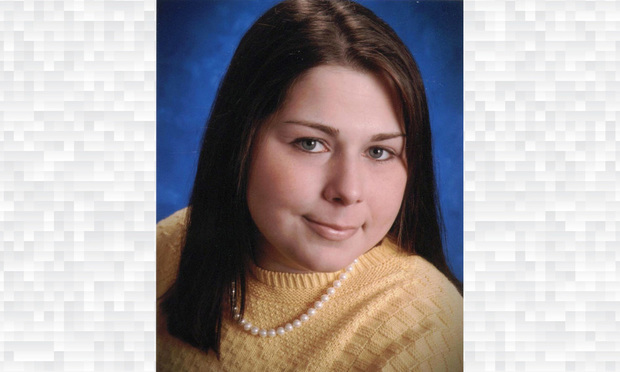Judge Rules Against Connecticut in $3.3M Medical Malpractice Lawsuit
Judge Cesar Noble sided with the family of Marguerite Miceli after determining proper treatment from the University of Connecticut Health Center would have saved her life.
August 10, 2018 at 06:08 PM
4 minute read
 Marguerite Miceli.
Marguerite Miceli.
A Hartford Superior Court judge issued a $3.3 million verdict Friday against the state in the death of a 23-year-old woman, after finding the University of Connecticut Health Center failed to properly treat her in 2012. A revised complaint was filed in January 2015 in Hartford Superior Court.
Following a 10-day bench trial, Judge Cesar Noble ruled for the family of Marguerite Miceli, agreeing she received inadequate care after arriving at the hospital in September 2012. Miceli, who suffered from lupus, arrived at the hospital's emergency room with symptoms requiring a routine blood test called a CBC and a Chem-7 test.
Koskoff Koskoff & Bieder's Katie Mesner-Hage, one of two attorneys for the family, said Miceli arrived at the hospital with shortness of breath that had been worsening, coupled with neurological symptoms. One side of her face went numb and her speech became slurred.
The CBC test would have revealed that Miceli was suffering from a blood disorder called thrombotic thrombocytopenic purpura, or TTP, that is often fatal if not treated promptly, Mesner-Hage said. Miceli was discharged without a diagnosis and returned to the hospital 32 hours later.
By then “it was too late to save her life,” Mesner-Hage said.
Mesner-Hage said the hospital claimed a CBC blood test did not need to be ordered, and that there was no way to prove she would have survived if she received the test.
Noble ruled timely treatment would have saved Miceli's life.
Trial testimony ”was very emotional” and included remarks from Miceli's sister and mother, Mesner-Hage said.
“Her mother described her as an old soul,” Mesner-Hage said, adding, “She was very devoted to her family and had the dream of becoming a pharmacist.”
Menser-Hage said Miceli's mother and sister and administrator of the estate, Francesca Miceli, “really brought Marguerite to life in the courtroom. They told of her grit and determination in the face of lupus. They told of her humor and silliness. She was the rock of the family. She had lost her father at the age of five due to a massive heart attack, so to lose her in this way — in such a preventable fashion — is so terrible.”
Her sister, Mesner-Hage said, talked on the stand about Miceli's dream of becoming a pharmacist. “Marguerite grew up hearing stories of her mom working in a pharmacy, although her mother did not pursue it professionally. Marguerite wanted more than anything to be a pharmacist. She started working in a pharmacy in high school and was working at her local pharmacy until her death. She was one month into pharmacy school.”
The most frustrating aspect of the case, Mesner-Hage said, was that the defense “tried to make the entire case about lupus. They said she would not have survived because she had lupus.”
Mesner-Hage added: “Instead of treating her like any other patient who deserved to have her symptoms looked at thoroughly and comprehensively, they looked at her and saw a young woman with lupus. Our position is that she got sub-standard care.”
The judge's award includes $1.3 million in economic damages and $2 million in noneconomic damages.
The state has 30 days to appeal to the Connecticut Appellate Court. The defense was represented by Robert Silva and Albert Danker, both of Rocky Hill-based O'Brien, Tanski & Young. Neither attorney responded to requests for comment Friday and Monday.
In March 2015 court papers filed in response to the plaintiff's January 2015 revised complaint, the defense argued it was up to attorneys for Miceli's estate to prove their case. It claimed there is “insufficient knowledge or information upon which to form a belief, and therefore leaves the plaintiff to her proof” of the claims that a lack of adequate care led to Miceli's death.
Lauren Woods, health information officer for University of Connecticut Health Center, said in a statement Monday: “While we work every day to provide the highest quality of care for every patient, we respect the court's decision and the judicial process that led to this result. We continue to extend our sincere condolences to the family for their loss.”
Mesner-Hage was assisted on the case by Josh Koskoff.
This content has been archived. It is available through our partners, LexisNexis® and Bloomberg Law.
To view this content, please continue to their sites.
Not a Lexis Subscriber?
Subscribe Now
Not a Bloomberg Law Subscriber?
Subscribe Now
NOT FOR REPRINT
© 2025 ALM Global, LLC, All Rights Reserved. Request academic re-use from www.copyright.com. All other uses, submit a request to [email protected]. For more information visit Asset & Logo Licensing.
You Might Like
View All
Inherent Diminished Value Damages Unavailable to 3rd-Party Claimants, Court Says
3 minute read


Trending Stories
- 1Uber Files RICO Suit Against Plaintiff-Side Firms Alleging Fraudulent Injury Claims
- 2The Law Firm Disrupted: Scrutinizing the Elephant More Than the Mouse
- 3Inherent Diminished Value Damages Unavailable to 3rd-Party Claimants, Court Says
- 4Pa. Defense Firm Sued by Client Over Ex-Eagles Player's $43.5M Med Mal Win
- 5Losses Mount at Morris Manning, but Departing Ex-Chair Stays Bullish About His Old Firm's Future
Who Got The Work
J. Brugh Lower of Gibbons has entered an appearance for industrial equipment supplier Devco Corporation in a pending trademark infringement lawsuit. The suit, accusing the defendant of selling knock-off Graco products, was filed Dec. 18 in New Jersey District Court by Rivkin Radler on behalf of Graco Inc. and Graco Minnesota. The case, assigned to U.S. District Judge Zahid N. Quraishi, is 3:24-cv-11294, Graco Inc. et al v. Devco Corporation.
Who Got The Work
Rebecca Maller-Stein and Kent A. Yalowitz of Arnold & Porter Kaye Scholer have entered their appearances for Hanaco Venture Capital and its executives, Lior Prosor and David Frankel, in a pending securities lawsuit. The action, filed on Dec. 24 in New York Southern District Court by Zell, Aron & Co. on behalf of Goldeneye Advisors, accuses the defendants of negligently and fraudulently managing the plaintiff's $1 million investment. The case, assigned to U.S. District Judge Vernon S. Broderick, is 1:24-cv-09918, Goldeneye Advisors, LLC v. Hanaco Venture Capital, Ltd. et al.
Who Got The Work
Attorneys from A&O Shearman has stepped in as defense counsel for Toronto-Dominion Bank and other defendants in a pending securities class action. The suit, filed Dec. 11 in New York Southern District Court by Bleichmar Fonti & Auld, accuses the defendants of concealing the bank's 'pervasive' deficiencies in regards to its compliance with the Bank Secrecy Act and the quality of its anti-money laundering controls. The case, assigned to U.S. District Judge Arun Subramanian, is 1:24-cv-09445, Gonzalez v. The Toronto-Dominion Bank et al.
Who Got The Work
Crown Castle International, a Pennsylvania company providing shared communications infrastructure, has turned to Luke D. Wolf of Gordon Rees Scully Mansukhani to fend off a pending breach-of-contract lawsuit. The court action, filed Nov. 25 in Michigan Eastern District Court by Hooper Hathaway PC on behalf of The Town Residences LLC, accuses Crown Castle of failing to transfer approximately $30,000 in utility payments from T-Mobile in breach of a roof-top lease and assignment agreement. The case, assigned to U.S. District Judge Susan K. Declercq, is 2:24-cv-13131, The Town Residences LLC v. T-Mobile US, Inc. et al.
Who Got The Work
Wilfred P. Coronato and Daniel M. Schwartz of McCarter & English have stepped in as defense counsel to Electrolux Home Products Inc. in a pending product liability lawsuit. The court action, filed Nov. 26 in New York Eastern District Court by Poulos Lopiccolo PC and Nagel Rice LLP on behalf of David Stern, alleges that the defendant's refrigerators’ drawers and shelving repeatedly break and fall apart within months after purchase. The case, assigned to U.S. District Judge Joan M. Azrack, is 2:24-cv-08204, Stern v. Electrolux Home Products, Inc.
Featured Firms
Law Offices of Gary Martin Hays & Associates, P.C.
(470) 294-1674
Law Offices of Mark E. Salomone
(857) 444-6468
Smith & Hassler
(713) 739-1250










